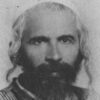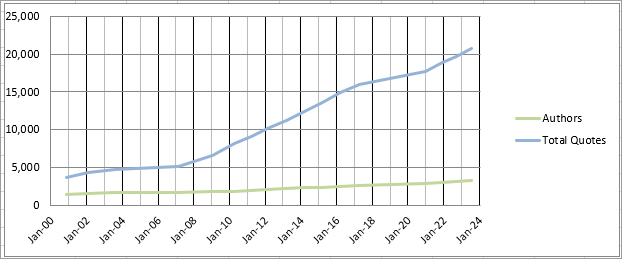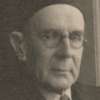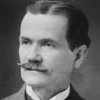If I believed that my reply were made
To one who ever in the world could dwell,
This flame without all motion would have stayed.
But since there never from this deep of Hell
Turned back again one soul, if truth I hear,
Fearless of infamy my tale I tell.S’i’ credesse che mia risposta fosse
a persona che mai tornasse al mondo,
questa fiamma staria sanza più scosse;
ma però che già mai di questo fondo
non tornò vivo alcun, s’i’ odo il vero,
sanza tema d’infamia ti rispondo.Dante Alighieri (1265-1321) Italian poet
The Divine Comedy [Divina Commedia], Book 1 “Inferno,” Canto 27, l. 61ff (27.61-66) [Montefeltro] (1309) [tr. Minchin (1885)]
(Source)
These two stanzas (in Italian) were used by T. S. Eliot as the epigraph for his poem, "The Love Song of J. Alfred Prufrock" (1915).
(Source (Italian)). Alternate translations:
If I beliv'd
That my reply were to a person made
Who ever should return into the world,
My Flame should without any motion rest.
But, since none ever from this Gulph alive
Return again, if what I've heard be true;
I'll answer without fear of infamy.
[tr. Rogers (1782), l. 57ff]
Thy rig'rous language found a vent
Firm as the rod of fate secures my fame,
As hence no tell-tale goes to spread my shame,
Else were thy rash untimely pray'r deny'd.
But, since the Stygian Bar prevents thy flight,
condemn'd to linker here in endless night,
Listen, sad Soul!
[tr. Boyd (1802), st. 20-21]
If I did think, my answer were to one,
Who ever could return unto the world,
This flame should rest unshaken. But since ne’er,
If true be told me, any from this depth
Has found his upward way, I answer thee,
Nor fear lest infamy record the words.
[tr. Cary (1814)]
Could I believe I were mine answer making
To one that ever should his path retrace
Back to the world, this flame no more were shaken;
But since none living from our dismal place
Hath e'er remounted, if I hear the truth,
I give thee answer, fearless of disgrace.
[tr. Dayman (1843)]
If I thought my answer to one who ever could return to the world, this flame would shake no more;
but since none ever did return alive from this depth, if what I hear be true, without fear of infamy I answer thee.
[tr. Carlyle (1849)]
If I thought that I was answering one
Who could return unto the world again,
Still without motion should this flame remain.
But since from out this dungeon never one
To earth returned, if what I've heard is true,
I fear no infamy in answering you.
[tr. Bannerman (1850)]
Did I believe my answer now were made
To one again to tread the upper world,
Then should this flame flicker and wave no more;
But since there never from this utter depth
Return'd one living thing, if such the truth,
Then will I answer thee and fear no shame.
[tr. Johnston (1867)]
If I believed that my reply were made
To one who to the world would e'er return,
This flame without more flickering would stand still;
But inasmuch as never from this depth
Did any one return, if I hear true,
Without the fear of infamy I answer.
[tr. Longfellow (1867)]
If I believed that my reply was to a person who should ever return to the world, this flame would stand without more shaking. But seeing that from this gulf none has returned alive, if I hear the truth, I answer thee without fear of infamy.
[tr. Butler (1885)]
If I could believe that my answer might be to a person who should ever return unto the world, this flame would stand without more quiverings; but inasmuch as, if I hear truth, never from this depth did any living man return, without fear of infamy I answer thee.
[tr. Norton (1892)]
Could I believe my answer were to one who would ever return to the world, this flame should stand for ever motionless ; but since none ever hath returned alive from out this gorge, if it be truth I hear, fearless of infamy I make my answer to thee.
[tr. Sullivan (1893)]
If I believed that my reply were given
To one who might the world, someday, revisit,
This flame would stay at rest without more flutter.
But, forasmuch as from this depth none ever
Did make return alive, if I hear truly.
Fearless of infamy I give thee answer.
[tr. Griffith (1908)]
If I thought my answer were to one who would ever return to the world, this flame should stay without another movement; but since one ever returned alive from this depth, if what I hear is true, I answer thee without fear of infamy.
[tr. Sinclair (1939)]
If I believed that my reply were made
To one who could revisit earth, this flame
Would be at rest, and its commotion laid.
But seeing that alive none ever came
Back from this pit, if it be truth I hear,
I answer without dread of injured fame.
[tr. Binyon (1943)]
If I thought that I were making
Answer to one that might return to view
The world, this flame should evermore cease shaking.
But since from this abyss, if I hear true,
None ever came alive, I have no fear
Of infamy, but give thee answer due.
[tr. Sayers (1949)]
If I believed that my reply were made
to one who could ever climb to the world again,
this flame would shake no more. But since no shade
ever returned -- if what I am told is true --
from this blind world into the living light,
without fear of dishonor I answer you.
[tr. Ciardi (1954)]
If I thought that my answer were to one who might ever return to the world, this flame would shake no more; but since from this depth none ever returned alive, if what I hear is true, I answer you without fear of infamy.
[tr. Singleton (1970)]
If I thought that I were speaking to a soul
who someday might return to see the world,
most certainly this flame would cease to flicker;
but since no one, if I have heard the truth,
ever returns alive from this deep pit,
with no fear of dishonor I answer you.
[tr. Musa (1971)]
If I thought my reply were meant for one
who ever could return into the world,
this flame would stir no more; and yet, since none --
if what I hear is true -- ever returned
alive from this abyss, then without fear
of facing infamy, I answer you.
[tr. Mandelbaum (1980)]
If I thought that I was making my reply
To anyone who would ever go back to the world,
This flame would stay absolutely still;
But since no one ever came back alive
From this deep place, if what I hear is true,
I answer you without fear of infamy.
[tr. Sisson (1981)]
If I believed I gave
My answer to one who'd ever go once more
Back to the world, this tongue fo flame would have
No motion. But since, if what I hear is true,
None every returned from this abyss alive,
Not fearing infamy I will answer you.
[tr. Pinsky (1994), l. 89ff]
If I believed that my reply were to a person who would ever return to the world, this flame would remain without further shaking;
but since never from this depth has any one returned alive, if I hear the truth, without fear of infamy I answer you.
[tr. Durling (1996)]
If I thought my answer was given to one who could ever return to the world, this flame would flicker no more, but since, if what I hear is true, no one ever returned, alive, from this deep, I reply, without fear of defamation.
[tr. Kline (2002)]
If I supposed that any word of this
were heard by one who might return to review
the world, my flame would stay forever voiceless.
But since none, if what I hear is true,
has from this deep returned alive, I fear
no ignominy when I answer you.
[tr. Carson (2002)]
Should I suppose, in answering, I spoke
to any person who should ever see
the world again, this flame would shake no more.
But since, if all I hear is true, there’s none
who ever yet, alive, escaped these deeps,
I may reply without the fear of infamy.
[tr. Kirkpatrick (2006)]
If I but thought that my response were made
to one perhaps returning to the world,
this tongue of flame would cease to flicker.
But since, up from these depths, no one has yet
returned alive, if what I hear is true,
I answer without fear of being shamed.
[tr. Hollander/Hollander (2007)]
If I believed that I were making an answer
To someone able to walk again in the living
World, this upright flame would stop its quivering,
But since no person has ever returned alive
From this depth of Hell, if what I hear is true,
I answer you without fear of disgrace.
[tr. Raffel (2010)]
If I thought now to afford
An answer to one bound to breathe the air
Again in the fair world, this flame would stand
With no more movement, but since none return
Alive from these depths, if I understand
Correctly what I hear, how could I earn
More infamy that I have now?
[tr. James (2013)]
The art of conversation, or the qualification for a good companion, is a certain self-control, which now holds the subject, now lets it go, with a respect for the emergencies of the moment.
Ralph Waldo Emerson (1803-1882) American essayist, lecturer, poet
Journal (1854)
(Source)
Reprinted in Journals of Ralph Waldo Emerson, 1820–1872, Vol. 3 (1912).
I have just now come from a party where I was its life and soul; witticisms streamed from my lips, everyone laughed and admired me, but I went away — yes, the dash should be as long as the radius of the earth’s orbit ——————————— and wanted to shoot myself.
Søren Kierkegaard (1813-1855) Danish philosopher, theologian
Journal (1836-04) [tr. Hannay (1982)]
(Source)
Papieren: 1 A 161; KJN: NB 2:53. Alternate translations:
I have just returned from a party of which I was the life and soul; wit poured from my lips, everyone laughed and admired me -- but I went away -- and the dash should be as long as the earth's orbit ——————————— and wanted to shoot myself.
[tr. Dru (1938)]
I have just come back from a party where I was the life and soul. Witticisms flowed from my lips. Everyone laughed and admired me -- but I left, yes, that dash should be as long as the radii of the earth's orbit ——————————— and wanted to shoot myself.
[tr. Hannay (1996)]
The truth that survives is simply the lie that is pleasant to believe.
H. L. Mencken (1880-1956) American writer and journalist [Henry Lewis Mencken]
A Little Book in C Major, ch. 2, § 31 (1916)
(Source)
An economist is a man that can tell you anything about — he’ll tell you what can happen under any given conditions, and his guess is liable to be just as good as anybody else’s, too.
Character is what emerges from all the little things you were too busy to do yesterday, but did anyway.
Mignon McLaughlin (1913-1983) American journalist and author
The Second Neurotic’s Notebook, ch. 4 (1966)
(Source)
Mark! where his carnage and his conquests cease!
He makes a solitude, and calls it — peace!George Gordon, Lord Byron (1788-1824) English poet
“The Bride of Abydos,” canto 2, st. 20 (1813)
(Source)
Adaptation from Tacitus' Agricola.
On the subject of Biblical texts and examples to why you can’t do certain things with your body that you wish to, I find that absolutely absurd. I’ve always been extremely uncomfortable with the idea in any society that belief is based on revealed truth, that’s to say on a text like a Bible or a Qur’an, or whatever it is. It seems to me that the greatness of our culture, for all its incredible faults, is that we have grown up on the Greek ideal of discovering the truth, discovering by looking around us, by empirical experiment, by the combination of the experience of generations of ancestors who have contributed to our sum knowledge of the way the world works, and so on. And to have that snatched away and to be told what to think by a book, however great it may be in places, this is a book that says you can sell your daughter into slavery, it’s a book that bans menstruating women from within miles of temples. The fact that it also says that for one man to lie with another man is an abomination, is no more made relevant or important than the fact that you can’t eat shellfish.
Stephen Fry (b. 1957) British actor, writer, comedian
An Evening with Callow & Fry, Norwich (2003-12)
(Source)
Farmers, pray for summers with lots of rain,
And winters with lots of sun.[Humida solstitia atque hiemes orate serenas,
agricolae.]Virgil (70-19 BC) Roman poet [b. Publius Vergilius Maro; also Vergil]
Georgics [Georgica], Book 1, l. 100ff (1.100) (29 BC) [tr. Ferry (2015)]
(Source)
(Source (Latin)). Alternate translations:
Swaines pray for winters faire, and summers wet.
[tr. Ogilby (1649)]
Ye Swains, invoke the Pow'rs who rule the Sky,
For a moist Summer, and a Winter dry.
[tr. Dryden (1709), ll. 146-147]
Ye husbandmen! intreat the gods by pray'r
For wat'ry solstices, and winters fair.
[tr. Nevile (1767)]
Swains! pray for wintry dust, and summer rain.
[tr. Sotheby (1800)]
Pray, ye swains, for moist summers and serene winters.
[tr. Davidson (1854)]
For winters dry, and showery summers, pray.
[tr. Blackmore (1871), l. 116]
Pray for showery summers and dry winters, husbandmen.
[tr. Wilkins (1873)]
Pray for wet summers and for winters fine,
Ye husbandmen.
[tr. Rhoades (1881)]
Now pay thy vows: be this the ploughman’s prayer:
Bright be the winter day, and moist the summer air.
[tr. King (1882), ll. 99-100]
Pray, ye swains, for moist summers and serene winters.
[tr. Bryce (1897)]
Pray for dripping midsummers and clear winters, O husbandmen.
[tr. Mackail (1899)]
Pray for wet summers and for winters fine,
Ye husbandmen.
[tr. Greenough (1900)]
For drizzling summers and sunny winters, husbandmen, pray.
[tr. Way (1912)]
For summers moist and windless winters fair
Pray heaven, ye farmer-folk.
[tr. Williams (1915)]
For moist summers and sunny winters, pray, farmers!
[tr. Fairclough (Loeb) (1916)]
Wet midsummers and fair winters are what the farmer
Should ask for.
[tr. Day-Lewis (1940)]
Pray for wet midsummers, farmer friends,
And clear, cold winter skies.
[tr. Bovie (1956)]
Wet skies in midsummer and clear in winter
Farmers should pray for.
[tr. Wilkinson (1982)]
Farmers, pray for moist summers and mild winters.
[tr. Kline (2001)]
Farmers pray for wet summers and winters with clear blue skies.
[tr. Lembke (2004)]
The countryman should pray for wet summers and mild winters.
[tr. Fallon (2006)]
For humid summers and winters mild, pray, O farmers.
[tr. Johnson (2009)]
O farmers, pray that your summers be wet and your winters clear.
[Bartlett's]
Good fences make good neighbors.
Robert Frost (1874-1963) American poet
“Mending Wall” (1914)
(Source)
The narrator's neighbor speaking. The phrase predates Frost (and has analogs in many languages and cultures), but achieved additional currency by his use.
Assassination is the extreme form of censorship.
George Bernard Shaw (1856-1950) British playwright and critic
The Shewing-up of Blanco Posnet, “The Rejected Statement, Part 1,” “The Limits to Toleration” (1909)
(Source)
There be many shapes of mystery.
And many things God makes to be,
Past hope or fear.
And the end men looked for cometh not,
And a path is there where no man thought.
So hath it fallen here.[πολλαὶ μορφαὶ τῶν δαιμονίων,
πολλὰ δ᾿ ἀέλπτως κραίνουσι θεοί·
καὶ τὰ δοκηθέντ᾿ οὐκ ἐτελέσθη,
τῶν δ᾿ ἀδοκήτων πόρον ηὗρε θεός.
τοιόνδ᾿ ἀπέβη τόδε πρᾶγμα.]Euripides (485?-406? BC) Greek tragic dramatist
Bacchæ [Βάκχαι], l. 1388ff, final lines [Chorus/Χορός] (405 BC) [tr. Murray (1902)]
(Source)
This sort of exit coda, as the Chorus exits, was apparently normal with Euripides. In fact this same text shows up in five of his plays (Bacchae, Alcestis, Andromache, Helen, and slightly modified, Medea), all of which have to do with reversals of fortune. Still, the identical text has some scholars debating whether one or more might later additions. See Kirk, Esposito, Gibbons / Segal for more discussion.
(Source (Greek)). Alternate translations:
A thousand shapes our varying Fates assume,
The Gods perform what least we could expect,
And oft the things for which we fondly hop'd
Come not to pass: Heaven finds a clue to guide
Our steps thro' the perplexing maze of life,
And thus doth this important business end.
[tr. Wodhull (1809)]
Many are the forms of divine things, and the gods bring to pass many things unexpectedly; what is expected has not been accomplished, but the god has found out a means for doing things unthought of. So too has this event turned out.
[tr. Buckley (1850)]
Many the forms in which God is made manifest,
Often He orders what seemed unexpected,
Much men resolve on remains uneffected,
Such men can not do God finds a way for;
Such is the meaning of what ye see.
[tr. Rogers (1872), l. 1358ff]
Many are the forms the heavenly will assumes, and many a thing the gods fulfil contrary to all hope; that which was expected is not brought to pass, while for the unlooked-for Heaven finds out a way. E’en such hath been the issue here.
[tr. Coleridge (1891)]
O the works of the Gods -- in manifold wise they reveal them:
Manifold things unhoped-for the Gods to accomplishment bring.
And the things that we looked for, the Gods deign not to fulfil them;
And the paths undiscerned of our eyes, the Gods unseal them.
So fell this marvelous thing.
[tr. Way (1898)]
The gods have many shapes.
The gods bring many things
to their accomplishment.
And what was most expected
has not been accomplished.
But god has found his way
for what no man expected.
So ends the play.
[tr. Arrowsmith (1960)]
Many are the shapes of things divine;
much the gods achieve beyond expectation;
and what seems probable is not accomplished,
whereas for the improbable, god finds a way.
Such was the result of this affair.
[tr. Kirk (1970)]
Gods manifest themselves in many forms,
Bring many matters to surprising ends;
The things we thought would happen do not happen;
The unexpected God makes possible:
And that is what has happened here to-day.
[tr. Vellacott (1973)]
Many the guises of the divine ones,
many surprises gods may accomplish'
and the expected finds no fruition,
all unexpected god finds a pathway.
Such was the outcome in this, our play.
[tr. Neuburg (1988)]
The Gods take many forms.
They manifest themselves in unpredictable ways.
What we most expect
does not happen.
And for the least expected
God finds a way.
This is what happened here today.
[tr. Cacoyannis (1982)]
Divinity takes many forms.
The gods accomplish many things beyond all hope.
What is expected is not brought to pass.
But god discovers means
To bring about the unexpected.
Such was the outcome here.
[tr. Blessington (1993)]
Many are the shapes of divinity,
many the things the gods accomplish against our expectation.
What seems proper is not brought to pass,
whereas for the improbable god finds a way.
Such was the outcome of this story.
[tr. Esposito (1998)]
Many are the shapes the gods will take,
many the surprises they perform.
What was thought likely did not transpire,
and what was unlikely the god made easy.
That is how this matter ended.
[tr. Woodruff (1999)]
Many are the shapes of what's divine.
Many unforeseen events the gods design.
What seemed most likely was not fulfilled;
What was unlikely, the god has willed.
Such were the things that end in this decline.
[tr. Gibbons/Segal (2000), l. 1609ff]
What heaven sends has many shapes, and many things the gods accomplish against our expectations. What men look for is not brought to pass, but a god finds a way to achieve the unexpected. Such was the outcome of this story.
[tr. Kovacs (2002)]
The gods take many forms,
The gods move in strange ways,
That which seemed, does not transpire
And that which did not, does.
That is what transpired here.
Turn out the lights.
[tr. Teevan (2002)]
That which was expected in this story did not come to pass, and for that which was expected, the god found a way. Perhaps mortals can never really grasp the workings of gods, for they do not follow a human design. They are a power of life we do not know, nor can fully understand.
[tr. Rao/Wolf (2004)]
The Fates have many guises and the gods bring about many things unexpected by mortals.
Those things we expect do not necessarily happen.
So ends this play.
[tr. Theodoridis (2005)]
Many are the forms of the Divine
And the gods brought to pass much unexpected,
And what was expected, not brought to pass;
And they did make possible th’impossible:
Thus did the affair turn out.
[tr. Valerie (2005)]
The gods appear in many forms,
carrying with them unwelcome things.
What people thought would happen never did.
What they did not expect, the gods made happen.
That's what this story revealed.
[tr. Johnston (2008)]
The gods take many shapes,
accomplish many things beyond our expectations.
What we look for does not come to pass;
what we least expect is fashioned by the gods.
And that is what has happened here today.
[tr. Robertson (2014)]
The shapes of god shift through many forms,
and lives are changed more than we could dream.
What we thought would happen did not,
but we have seen the god reveal
the true order of the world.
[tr. Behr/Foster (2019)]
Many are the forms of divine powers
Many are the acts the gods unexpectedly make.
The very things which seemed likely did not happen
but for the unlikely, some god found a way.
This turned out to be that kind of story.
[tr. @sentantiq (2019)]
Many are the forms of things of the daimones, and the gods bring many things to pass unexpectedly. What is expected does not come to telos, and a god finds a way for the unexpected. So too has this affair turned out.
[tr. Buckley/Sens/Nagy (2020)]
In pushing other species to extinction, humanity is busy sawing off the limb on which it perches.
Paul Ehrlich (b. 1932) American conservation biologist and ecologist
(Attributed)
All citations for this I found are from a reference in Elizabeth Kolbert, The Sixth Extinction: An Unnatural History, ch. 13 (2014), to a sign in the American Museum of Natural History's Hall of Biodiversity which "offers a quote from the Stanford ecologist Paul Ehrlich," giving the above text.
I was unable to find the phrase in Ehrlich's written work, though it could be from a speech, media comment, etc.
In Ehrlich's One with Ninevah: Politics, Consumption, and the Human Future (2005), the epigraph for chapter 2 is a quotation from William R. Catton, Jr., Overshoot: The Ecological Basis of Revolutionary Change, ch. 2 (1980), regarding Earth's finite non-renewable resources:
This fact puts mankind out on a limb which the activities of modern life are busily sawing off.
This might be the source of a misattribution to Ehrlich, though the context is not quite the same, and the metaphor of sawing off the branch one is sitting on is not unique to Ehrlich or Cotton. More research is needed.
Mirth pleaseth some, to others ’tis offence,
Some commend plain conceit, some profound sense;
Some wish a witty Jest, some dislike that,
And most would have themselves they know not what.
Then he that would please all, and himself too,
Takes more in hand than he is like to do.Benjamin Franklin (1706-1790) American statesman, scientist, philosopher, aphorist
Poor Richard (1733)
(Source)
Life is like a camel: you can make it do anything except back up.
Marcelene Cox (1900-1998) American writer, columnist, aphorist
“Ask Any Woman” column, Ladies’ Home Journal (1945-07)
(Source)
The Lord, the Slave, the Peasant, and the King
Unlike in life, in death the self-same thing.[Mors dominos servis et sceptra ligonibus æquat,
Dissimiles simili conditione trahens.]Walter Colman (1600-1645) English Franciscan friar
“La Danse Machabre or Death’s Duell,” st. 262 (c. 1633)
(Source)
In Hoyt's New Cyclopedia of Practical Quotations (1922), this is translated:
Death levels master and slave, the sceptre and the law,
and makes the unlike like.
DEAR MISS MANNERS: What is the proper way to eat potato chips?
GENTLE READER: With a knife and fork. A fruit knife and an oyster fork, to be specific. Good heavens, what is the world coming to? Miss Manners does not mind explaining the finer points of gracious living, but she feels that anyone without the sense to pick up a potato chip and stuff it in their face should probably not be running around loose on the streets.
History. We want to find moral lessons in it, but its only lessons are of politics, military art, etc.
Joseph Joubert (1754-1824) French moralist, philosopher, essayist, poet
Pensées [Thoughts], 1806 [tr. Auster (1983)]
(Source)
I have been unable to find an analog in other translations, or in the original French.
When you live with a joyful sense of purpose, when you infuse your life with a greater purpose beyond your individual self, every aspect of your karma can become a brilliant facet of your mission. You can transform sorrow and adversity of any sort into joy, stability, health, and prosperity. By changing poison into medicine and accomplishing your inner revolution, you can use every experience of karma to encourage others who suffer from the same problems that you overcame.
You can become an ambassador of hope, an essential and radiant treasure of humanity, in which you recognize that all who have ever lived are members of your extended family.
As you continue to spread light in this way, actively doing good in the world, that energy will come back to you in abundant positivity. When you refuse to perpetuate any bad that has been done to you, you can free yourself from the chains of negativity.
Tina Turner (1939-2023) American singer, songwriter, actress [b. Anna Mae Bullock]
Happiness Becomes You, ch. 8 (2020)
(Source)
Those whom the Gods wish to destroy, they first make bored.
Ian Fleming (1908-1964) British writer, journalist, intelligence officer
From Russia with Love, Part 2, ch. 11 (1957)
(Source)
A "curious bastard quotation" (variant of a phrase attributed to Euripides) that crosses Bond's mind when wondering if ennui is driving him to tank his own career.
All the world is a very narrow bridge, and the most important thing is not to be overwhelmed by fear.
כל העולם כולו גשר צר מאוד, והעיקר – לא לפחד כלל.
Nachman of Breslov (1772-1810) Ukrainian Jewish Hasidic leader, rabbi, kabbalist [רַבִּי נַחְמָן מִבְּרֶסְלֶב; of Bratslav; of Bracław]
(Paraphrase)
The original of this passage, in Nachman's Likutey Moharan, Part 2, 48:2, is:
[וְדַע, שֶׁהָאָדָם צָרִיך לַעֲבר עַל גֶּשֶׁר צַר מְאֹד מְאֹד וְהַכְּלָל וְהָעִקָּר שֶׁלּא יִתְפַּחֵד כְּלָל]
which is variously translated:
And know, a person needs to make his passage on a very, very narrow bridge, and the rule and the essence is to not be afraid at all.
[Source]
Know that [when] a person needs to cross a very, very narrow bridge, the general principle and main point is not to make oneself at all terrified.
[Source]
Now know, a person needs to pass over on a very, very narrow bridge, and the rule and the essence is to not be afraid at all.
[Source]
This Nachman quote was paraphrased and set to music in the Hebrew tune, "Kol Ha'Olam Kulo [כָּל הָעוֹלָם כֻּלוֹ]":
Kol ha'olam kulo
Gesher tzar me'od,
Veha'ikar lo le'fached klal.
Other translations of the song include:
More information about the song:
- "All the world is a very narrow bridge, and the essence is not to fear at all."
- "All the world is a very narrow bridge, and the essence is, don't be afraid at all."
- "The whole world is a narrow bridge, but the main thing is not to be at all afraid."
- "All the world is a very narrow bridge. / But the main thing to recall / Is to have no fear at all."
When on all sides you showed me that your words were true, and I was overcome by your truth, I had no answer whatsoever to make, but only those slow and drowsy words, “Right away. Yes, right away.” “Let me be for a little while.” But “Right away — right away” was never right now, and “Let me be for a little while” stretched out for a long time.
[Undique ostendenti vera te dicere, non erat omnino quid responderem veritate convictus, nisi tantum verba lenta et somnolenta: “modo,” “ecce modo,” “sine paululum.” Sed “modo et modo” non habebat modum et “sine paululum” in longum ibat.]
Augustine of Hippo (354-430) Christian church father, philosopher, saint [b. Aurelius Augustinus]
Confessions, Book 8, ch. 5 / ¶ 12 (8.5.12) (c. AD 398) [tr. Ryan (1960)]
(Source)
Augustine writing of his reluctance to convert to Christianity. Sometimes paraphrased "By and by never comes."
(Source (Latin)). Alternate translations:
And when Thou didst on all sides show me that what Thou saidst was true, I, convicted by the truth, had nothing at all to answer, but only those dull and drowsy words, "Anon, anon," "presently," "leave me but a little." But "presently, presently," had no present, and my "little while" went on for a long while.
[tr. Pusey (1838)]
And to Thee showing me on every side, that what Thou saidst was true, I, convicted by the truth, had nothing at all to reply, but the drawling and drowsy words: “Presently, lo, presently;” “Leave me a little while.” But “presently, presently,” had no present; and my “leave me a little while” went on for a long while.
[tr. Pilkington (1876)]
And to Thee, on all sides showing me that what Thou saidst was true, I, convicted by the truth, had nothing to say in reply, but only drawling and drowsy words, “Presently; yes, presently;” “Wait a little while." But “presently and presently" had no present; and “wait a little while” went on to a long while.
[tr. Hutchings (1890)]
On all sides Thou didst show me that Thy words are true, and the truth confounded me, so that I could make no reply but slow and drowsy words: "Presently, O presently; let me be a little while.” But my "presently, presently," had no present, and the little while proved a long while.
[tr. Bigg (1897), 8.5.3]
Whereas You showed me by every evidence that Your words were true, there was simply nothing I could answer save only laggard lazy words: “Soon,” “Quite soon,” “Give me just a little while.” But “soon” and “quite soon” did not mean any particular time; and “just a little while” went on for a long while.
[tr. Sheed (1943)]
On all sides, thou didst show me that thy words are true, and I, convicted by the truth, had nothing at all to reply but the drawling and drowsy words: “Presently; see, presently. Leave me alone a little while.” But “presently, presently,” had no present; and my “leave me alone a little while” went on for a long while.
[tr. Outler (1955)]
You used all means to prove the truth of your words, and now that I was convinced that they were true, the only answers I could give were the drowsy words of an idler -- "Soon," "Presently," "Let me wait a little longer." But "soon" was not soon and "a little longer" grew much longer.
[tr. Pine-Coffin (1961)]
And, while you showed me wherever I looked that what you said was true, I, convinced by the truth, could still find nothing at all to say except lazy words spoken half asleep: "A minute," "just a minute," "just a little time longer." But there was no limit to the minutes, and the little time longer went a long way.
[tr. Warner (1963)]
Though you showed me on every side that what you said was true, though convinced of that truth, I had nothing at all to answer other than some dull and drowsy words: "Soon," "Coming soon," "Leave me just a little." But my "little while" stretched on and on.
[tr. Blaiklock (1983)]
You plied me with evidence that you spoke truly; no, I was convinced by the truth and had no answer except the sluggish, drowsy words, "Just a minute," "One more minute," "Let me have a little longer." But these "minutes" never diminished, and my "little longer" lasted inordinately long.
[tr. Boulding (1997)]
LEAR: Mend your speech a little,
Lest you may mar your fortunes.William Shakespeare (1564-1616) English dramatist and poet
King Lear, Act 1, sc. 1, l. 103ff (1.1.103-104) (1606)
(Source)
Always dream and shoot higher than you know you can do. Don’t bother just to be better than your contemporaries or predecessors. Try to be better than yourself.
William Faulkner (1897-1962) American novelist
“The Art of Fiction No. 12,” interview by Jean Stein, The Paris Review (Spring 1956)
(Source)
On being a good novelist.
Celebrity: the advantage of being known by those who do not know you.
[Célébrité: l’avantage d’être connu de ceux qui ne vous connaissent pas.]
Nicolas Chamfort (1741-1794) French writer, epigrammist (b. Nicolas-Sébastien Roch)
Products of Perfected Civilization [Produits de la Civilisation Perfectionée], Part 1 “Maxims and Thoughts [Maximes et Pensées],” ch. 1, ¶ 135 (1795) [tr. Mathers (1926)]
(Source)
(Source (French)). Alternate translations:
Celebrity: the advantage of being known to those who do not know you.
[tr. Hutchinson (1902)]
Celebrity: the advantage of being known by those who do not know you.
[tr. Merwin (1969)]
Being a celebrity gives you the advantage of being known to those not of your acquaintance.
[tr. Pearson (1973)]
Celebrity: the advantage of being known by those who do not know you.
[tr. Dusinberre (1992)]
Celebrity: the advantage of being known by people who don't know you.
[tr. Parmée (2003), ¶ 111]
Celebrity: the advantage of being recognized by people who don't know you.
[Source]
It seems that life is not easy for any of us. But what of that? We must have perseverance and above all confidence in ourselves. We must believe that we are gifted for something, and that this thing, at whatever cost, must be attained.
[La vie n’est facile pour aucun de nous. Mais quoi, il faut avoir de la persévérance, et surtout de la confiance en soi. Il faut croire que l’on est doué pour quelque chose, et que, cette chose, il faut l’atteindre coûte que coûte.]
Marie Curie (1867-1934) Polish-French physicist and chemist [b. Maria Salomea Skłodowska]
Letter to her brother Joseph (1894-03-18)
(Source)
(French (Source))
As quoted in Eve Curie Labouisse, Madame Curie: A Biography, ch. 9 (1937) [tr. Sheean (1938)].
You could say to the universe this is not fair. And the universe would say: Oh, isn’t it? Sorry.
Land, gold, and trifles many give or lend,
But he that stoops in fame is a rare friend.[Aurum et opes et rura frequens donabit amicus:
Qui velit ingenio cedere, rarus erit.]Martial (AD c.39-c.103) Spanish Roman poet, satirist, epigrammatist [Marcus Valerius Martialis]
Epigrams [Epigrammata], Book 8, epigram 18 (8.18.9-10) (AD 94) [tr. Taylor (1657)]
(Source)
To a friend whom Martial considered as good or better an writer, who in turn publicly lauded Martial as the superior.
"To Cirinius." (Source (Latin)). Alternate translations:
Friends oft to friends in other points submit;
Few yield the glory of the field in wit.
[tr. Hay (1755)]
A friend will oft bestow gold, goods, or ground:
But who his wit will yield, is rarely found.
[tr. Elphinston (1782); Book 2, ep. 103]
It is not uncommon for one friend to bestow on another good and land, but to make concessions of literary pre-eminence is a rare proof of friendship.
[tr. Amos (1858)]
Gold, and wealth, and estates, many a friend will bestow; one who consents to yield the palm in genius, is rare.
[tr. Bohn's Classical (1859)]
Gold and possessions and lands many a friend will bestow: he who is willing to yield in genius will be rare.
[tr. Ker (1919)]
Full many a friend will give you wealth and fields;
But rare is he who thus in genius yields.
[tr. Pott & Wright (1921)]
Gold, wealth, estates will many a man resign
To save a friend, but few the bay divine.
[tr. Francis & Tatum (1924), #400]
Many a friend will give gold and riches and land, but one prepared to yield in talent will be found but seldom.
[tr. Shackleton Bailey (1993)]
Some friends will give up goods or yield their gold.
But few will let their own worth go untold.
[tr. Wills (2007)]
A friend will often give gold, wealth, and ground:
one who will yield in talent's rarely found.
[tr. McLean (2014)]
The country of the aged is a land few people think very hard and seriously about before the time of life when they sense they’re arriving there.
Maggie Scarf (b. 1932) American writer, journalist, lecturer
Unfinished Business, ch. 18 (1980)
(Source)
Consider what you came from: you are Greeks!
You were not born to live like mindless brutes
but to follow paths of excellence and knowledge.[Considerate la vostra semenza:
fatti non foste a viver come bruti,
ma per seguir virtute e canoscenza.]Dante Alighieri (1265-1321) Italian poet
The Divine Comedy [Divina Commedia], Book 1 “Inferno,” Canto 26, l. 118ff (26.118-120) [Ulysses] (1309) [tr. Musa (1971)]
(Source)
Speaking to his sailors on their final voyage, urging them to explore the unknown.
(Source (Italian)). Alternate translations:
On your original reflect, nor think
That you were, made, like Brutes, to only live,
But knowledge and to virtuous acts pursue.
[tr. Rogers (1782)]
Recall your glorious toils, your lofty birth.
Nor like the grov'ling herds, ally'd to earth.
No base despondence quit your lofty claim.
[tr. Boyd (1802), st. 19]
Call to mind from whence we sprang:
Ye were not form’d to live the life of brutes
But virtue to pursue and knowledge high.
[tr. Cary (1814)]
Bethink you of your birth-rank and its dues:
Ye were not thus for brutish life endued.
But Virtue's path and Learning's born to chuse.
[tr. Dayman (1843)]
Consider your origin: ye were not formed to live like brutes, but to follow virtue and knowledge.
[tr. Carlyle (1849)]
Consider, then, the birth from whence you sprung:
You were not made, like brutes, to live and die:
The path of virtue and of knowledge try.
[tr. Bannerman (1850)]
Consider well the seed from whence you sprung;
You were not made to live as live the beasts,
But to seek virtue and true knowledge grasp.
[tr. Johnston (1867)]
Consider ye the seed from which ye sprang;
Ye were not made to live like unto brutes,
But for pursuit of virtue and of knowledge.
[tr. Longfellow (1867)]
Consider your begetting; ye were not made to live as brutes, but to follow virtue and knowledge.
[tr. Butler (1885)]
Over your noble birthright ye should muse;
To live like senseless brutes ye were not made,
But knowledge to pursue and virtue use.
[tr. Minchin (1885)]
Consider ye your origin; ye were not made to live as brutes, but for pursuit of virtue and of knowledge.
[tr. Norton (1892)]
Bethink you of your birth: ye were not made to live the life of brutes, but to obey the call of valour and of knowledge.
[tr. Sullivan (1893)]
Consider ye the seed that ye are sprung from:
Ye were not made to live as the brute creatures,
But that ye virtue might pursue and knowledge.
[tr. Griffith (1908)]
Take thought of the seed from which you spring. You were not born to live as brutes, but to follow virtue and knowledge.
[tr. Sinclair (1939)]
Think on the seed ye spring from! Ye were made
Not to live life of brute beasts of the field
But follow virtue and knowledge unafraid.
[tr. Binyon (1943)]
Think of your breed; for brutish ignorance
Your mettle was not made; you were made men.
To follow after knowledge and excellence.
[tr. Sayers (1949)]
Greeks! You were not born to live like brutes,
but to press on toward manhood and recognition!
[tr. Ciardi (1954), l. 110]
Consider your origin: you were not made to live as brutes, but to pursue virtue and knowledge.
[tr. Singleton (1970)]
Consider well the seed that gave you birth:
you were not made to live your lives as brutes,
but to be followers of worth and knowledge.
[tr. Mandelbaum (1980)]
Consider then the race from which you have sprung:
You were not made to live like animals,
But to pursue virtue and know the world.
[tr. Sisson (1981)]
Consider well your seed:
You were not born to live as a mere brute does,
But for the pursuit of knowledge and the good.
[tr. Pinsky (1994)]
Consider your sowing: you were not made to live like brutes, but to follow virtue and knowledge.
[tr. Durling (1996)]
Consider your origin: you were not made to live like brutes, but to follow virtue and knowledge.
[tr. Kline (2002)]
Hold clear in thought your seed and origin.
You were not made to live as mindless brutes,
but go in search of virtue and true knowledge.
[tr. Kirkpatrick (2006)]
Consider how your souls were sown:
you were not made to live like brutes or beasts,
but to pursue virtue and knowledge.
[tr. Hollander/Hollander (2007)]
Think of your origins, the people you come from:
You were not made to live like wild-toothed beasts,
But for the pursuit of virtue and honest knowledge.
[tr. Raffel (2010)]
Remember now your pedigree.
You were not born to live as brutes. Virtue
And knowledge are your guiding lights.
[tr. James (2013)]
There is no arena in which vanity displays itself under such a variety of forms as in conversation.
[Il n’est point d’arène où la vanité se montre sous des formes plus variées que dans la conversation.]
Germaine de Staël (1766-1817) Swiss-French writer, woman of letters, critic, salonist [Anne Louise Germaine de Staël-Holstein, Madame de Staël, Madame Necker]
Germany [L’Allemagne], Part 1, ch. 11 “Of the Spirit of Conversation” (1813)
(Source)
(Source (French)).
Sometimes misattributed to Marguerite Gardiner (Lady Blessington), due to this quote (there attributed to de Stael) being included in the Preface to R. R. Madden, The Literary Life and Correspondence of the Countess of Blessington, Vol. 1 (1855).
Administrivia: Doing the Numbers, 7/2023
Time for another “State of the WIST” post. I last ran this report in September 2022; time flies when you’re having fun.
I’ve been pretty consistent about getting new quotes loaded in over the past year — my goal is 5-6 quotes posted per weekday. A gradually increasing number of quotes in my backlog turn out to be ones that I already have in the system, in which case, if I end up making substantive improvements (sourcing, adding notes, expanding alternate translations), I count that upgrade as a “new” quote in my head for purposes doing my quotational duty (even if it doesn’t actually add to the “count,” doesn’t show up on the front page, and doesn’t go into my RSS feed).
What’s happened over here since last time?
Some changes that took place on the WordPress site the past year:
- Went over 20,000 quotations in the database. That was about 10½ years since I topped 10,000 — manually curating everything takes time and effort.
- Had a major behind-the-scenes upgrade done to my theme, as detailed here, to make it responsive to different sized screens (mobile, tablet, laptop, desktop).
- Kept things updated — WIST is currently on WordPress 6.2.2. I usually wait a month or so after each point release, as the RSS feed program files have to be serviced manually when I do an update, and 0.x and 0.0.x can be fairly frequent after a release (though Automattic seems to be doing a better job about beta testing the past few releases). I have not updated to using the Gutenberg stuff that the WP folk seem so insistent on; I run a pretty basic blog here, and they keep trying to turn WP into a site editor. Sigh.
- I withdrew from Twitter, like so many others, and opened up a mirror shop in Mastodon. I also have my Diaspora* site still running, though that’s a more manual effort.
- I played with a Dark Mode tool that have a few technical problems I am currently trying to get fixed.
Doing the Numbers
Let’s look at the numbers:
So continued progress, despite some housecleaning — deleting duplicates, and updating old posts with better metadata.
Broken out into a graph (and normalizing the time frame):
Working from Home much of the time does help keep those numbers up.
Note that, as always, all of these quotations are personally curated to some degree or another — digging out citations and online links when possible, finding author photos, etc. No mass uploads for me.
I currently stand at 710 quotes flagged as meme/visual quotations. That number’s gone up from 685 last September, though slowly; I generate one of these every few weeks.
Top Authors
Of the authors I have, who are the most quoted in WIST?
As the numbers get higher, it’s harder folk to do more than shuffle around, esp. barring I find any massive new source of quotations (and time to put them in). That said, Terry Pratchett did manage to push Martin Luther King, Jr., off the Top Ten list this year, in part because I have had a bunch of Pratchett’s quote in the queue to add, in part because I shifted the Good Omens quotes to under his name rather than Neil Gaiman (given Gaiman’s own estimate of how many of the words each of them did on the book) (Gaiman gets a “with” credit on the quote, but only one author can be posted in the database, as currently structured).
And, yes, there we are with a bunch of white guys. Sigh.
This table is more for curiosity’s sake than any real meaning, showing not just how prolific these folk are, but how interested I am in recording things these individuals said.
The Top Ten Author list is shown “live” in the sidebar (“Prolific Authors“).
Top Quotations
Here are the Top 10 Most Visited Quotations Ever (with how they’ve changed since September 2022). I find these interesting, since it’s not driven anything I do, but page hits by visitors:
- – (12,036, was 10,505) John Kenneth Galbraith, “Wealth and Poverty,” speech, National Policy Committee on Pockets of Poverty (13 Dec 1963)
- – (7,763, was 6,743) Aeschylus, Agamemnon, ll. 175-183 [tr. Johnston (2007)]
- – (6,393, was 6,288) Robert Frost, “The Lesson for Today,” A Witness Tree (1942)
- – (6,072, was 5,716) Bertand Russell, “The Triumph of Stupidity” (10 May 1933)
- ↑ (5,812, was 4,407) Republic, Book 1, 347c
- ↑ (5,390, was 4,678) Rainer Maria Rilke, Letter to Clara Rilke (1 Jan 1907)
- ↑ (5,226, was 4,910) Fran Lebowitz, “Tips for Teens,” Social Studies (1981)
- ↓ (5,013, was 4,972) John Steinbeck, Nobel prize acceptance speech (10 Dec 1962)
- – (4,649 was 4,590) William Hazlitt, “On The Conduct of Life” (1822)
- ♥ (4,635, new on list) Sa’adi “Bani Adam [The Children of Adam]” (1258)
The quote from Plato, which debuted last time in 9th, has crept up to 5th. Steinbeck’s entry here slipped a lot, and we lost a delightful Isaac Asimov quote. Sic transit gloria mundi. In its place we have a lovely quote from the Persian poet Sa’adi, which has been in my database forever, but for which I did a lot of research, created a meme image, etc., which drove a lot of traffic.
Since 9/2022, the Top 10 viewed quotes were, according to Google Analytics:
- ↑ 1,287 views – Sa’adi — “Bani Adam [The Children of Adam]” (1258)
- ↓ 1,192 views – Plato — Republic, Book 1, 347c
- – 854 views – Aristotle — (Attributed)
- ♥ 837 views – Aeschylus — Agamemnon, ll. 175-183
- ↑ 660 views – Aristotle — Nicomachean Ethics [Ἠθικὰ Νικομάχεια] (c. 325 BC) (paraphrase)
- – 650 views – Rilke, Rainer Maria — Letter to Clara Rilke (1 Jan 1907)
- – 627 views – Franz Kafka — Letter to Oskar Pollak (27 Jan 1904)
- ♥ 474 views – Zora Neale Hurston — (Attributed)
- ♥ 445 views – Eric Hoffer — The Temper of Our Time (1967)
- ↓ 420 views – Homer — The Odyssey [Ὀδύσσεια], Book 6, l. 180ff (6.180) [Odysseus to Nausicaa] (c. 700 BC) [tr. Rieu (1946)]
Dropping off from the list were quotes from Fran Lebowitz, Charles Lamb, and that perennial John Kenneth Galbraith quote.
A side note on Kafka — there was one quotation that remained in the Top 10, but within the Top 10 were also 2,237 views for Kafka’s overall archive, which might have also been referring to that one quote — or maybe for others.
Who Are You People?
As Google Analytics gets more complex, figuring out old simplistic stats becomes a bit more difficult. As far as I can tell, though compared to 9/2022, I am getting 196 visitors / day (vs 177) and 215 pages visited / day (vs 228). So visits are up, but pages viewed are a bit down. Which sounds fairly stable, but I also had a significant upsurge in both stats at the beginning of March, with the new theme, and it’s been disappointing to see the numbers on the decline.
More research is called for.
I also have 11 follow-by-email users with Follow.it.
Over in social media, I gave up on the cess pit that is Twitter 2.whatever, and shifted over to Mastodon; I ostensibly had 143 Twitter followers (including an uncertain number of bots), while on Mastodon I currently have 68 followers — but I’m getting a lot more interaction than I was on Twitter in terms of likes and forwards, so I’m happy there. I have 86 contacts on my Diaspora* mirror (up from 69), and I actually get some good engagement over there as well with likes and discussion.
In fact, that’s one of the interesting things about the Internet — my home WIST.info blog gets a lot of hits — but it’s nearly all through search, rather than (as in the old days) people visiting through RSS or dropping in every few days. View counts on individual posts used to be in the tens, twenties, forties; these days, on the front page it’s a whole series of zeroes.
Google Analytics isn’t giving me data on gender or age any more, alas. As far as national representation, we have the US (49%), UK (7%), China (7%, a big surge), Canada (5%) and India (5%). That mirrors the language, with English (82%), Chinese (7%) as the vast majority of users.
(There is a 2%-ish German contingent, too, which is kind of cool.)
Browser-wise, Chrome increased its lead to 60%, with Safari at 31%, Edge and Firefox just about 4% each. That’s interesting to cross-reference with OS, where Windows is 33% of the users, iOS 24%, Mac another 20%, and Android at 18%, ChromeOS at 3%. The iOS and Android numbers are interesting, having gone up only slightly, given the effort to make the screen presentation responsive.
The Year Ahead
- I’d like to figure out how to drive up traffic (or, framed another way, understand if I am somehow keeping traffic away).
- I want to settle on a Dark Mode tool, since all the cool kids are doing it (and there are times when it is handy).
- Continue backfilling tags as I come across quotes that have captured my eye again.
- Maybe do some tag cleanup (there are some that are redundant — plural vs singular — and others where I’ve inadvertently concatenated terms). I poked at that a bit, and it’s a heck of a lot more difficult than it should be, so we’ll see.
- Continue making some author sweeps to normalize how some works are organized.
- Continue work on parallel translations of foreign works.
And that’s the end of the Q3 report for 2023. See you next time I get an urge to do this!
What we commonly have in our mind when we speak of religion is a definite set of doctrines, of a more or less metaphysical character, formulated in a creed and supported by an organization distinct from the state. And the first thing we have to learn about the religion of the Greeks is that it included nothing of the kind. There was no church, there was no creed, there were no articles. Priests there were, but they were merely public officials, appointed to perform certain religious rites. The distinction between cleric and layman, as we know it, did not exist; the distinction between poetry and dogma did not exist; and whatever the religion of the Greeks may have been, one thing at any rate is clear, that it was something very different from all that we are in the habit of associating with the world.
G. Lowes Dickinson (1862-1932) British political scientist and philosopher [Goldsworthy "Goldie" Lowes Dickinson]
The Greek View of Life, ch. 1 “Religion,” sec. 1 (1911)
(Source)
I conceive that there is nothing which gives a man more pause before taking as absolute what his feelings welcome, and his mind deems plausible, than even the flicker of recollection that something of the sort has been tried before, felt before, disputed before, and for some reason or other has now quite gone into Limbo.
Learned Hand (1872-1961) American jurist
“Sources of Tolerance,” speech, University of Pennsylvania Law School (1930-06)
(Source)
She has frolicsome moods, in which a thimble, a shoe-buttoner, a scrap of paper, or a piece of string will drive her wild with delight; she has moods of inflexible gravity, in which she stares solemnly at her favorite ball rolling over the carpet, without stirring one lazy limb to reach it. “Have I seen this foolish toy before?” she seems to be asking herself with musing austerity; “and can it be possible that there are cats who run after such frivolous trifles? Vanity of vanities, and all is vanity, save only to lie upon the hearth-rug, and be warm, and think grave thoughts to feed a serious soul.”
I feel that art has something to do with the achievement of stillness in the midst of chaos. A stillness that characterizes prayer, too, and the eye of the storm. I think that art has something to do with an arrest of attention in the midst of distraction.
Possess your soul without fussing; your guardian angel does not lose half the sleep over you you think he does.
Austin O'Malley (1858-1932) American ophthalmologist, professor of literature, aphorist
Keystones of Thought (1914)
(Source)
Moderation. Small helpings. Sample a little bit of everything. These are the secrets of happiness and good health. You need to enjoy the good things in life, but you need not overindulge.
Julia Child (1912-2004) American chef and writer
“What I’ve Learned,” interview by MIke Sager, Esquire (2001-06)
(Source)
One cannot have too large a party. A large party secures its own amusement.
Machines are a great thing, but if one replaces a hundred men, it don’t buy anything, it don’t eat anything, while the hundred men spend theirs back for food, shelter, and hundreds of various commodities for them and their families.
“Let your conscience be your guide” is a silly thing to say to a good man, or a bad one.
Mignon McLaughlin (1913-1983) American journalist and author
The Second Neurotic’s Notebook, ch. 5 (1966)
(Source)
A man must serve his time to every trade
Save Censure — Critics all are ready made.George Gordon, Lord Byron (1788-1824) English poet
“English Bards and Scotch Reviewers,” l. 63ff (1809)
(Source)
Write it on your heart that every day is the best day in the year. He is rich who owns the day, and no one owns the day who allows it to be invaded with fret and anxiety. Finish every day and be done with it. You have done what you could. Some blunders and absurdities, no doubt crept in. Forget them as soon as you can, tomorrow is a new day; begin it well and serenely, with too high a spirit to be cumbered with your old nonsense. This new day is too dear, with its hopes and invitations, to waste a moment on the yesterdays.
Ralph Waldo Emerson (1803-1882) American essayist, lecturer, poet
(Spurious)
This widely spread inspirational quotation is actually a piecing-together of multiple phrases from different sources, some not even Emerson. It includes bits from his essay "Works and Days" (here and here), observations on Emerson by Lillian Whiting, and fragments from a letter by him to his daughter Ellen.
The result sounds much like Emerson, but would require more ellipses than text to qualify as a quotation of him. It would be a great candidate for an AI "quotation" except that references to it can be found back in the 2010s, so it is almost certainly of human origin.
More detailed discussion: poetry - From which book or essay are these words by Ralph Waldo Emerson? "Write it on your heart that every day is the best day in the year..." - Literature Stack Exchange.
You will hear things like, “Science doesn’t know everything.” Well, of course science doesn’t know everything. But because science doesn’t know everything, that doesn’t mean science knows nothing. Science knows enough for us to be watched by a few million people now on television, for these lights to be working, for quite extraordinary miracles to have taken place in terms of the harnessing of the physical world and our dim approaches towards understanding it.
Art followed hard on art. Toil triumphed over every obstacle, unrelenting Toil, and Want that pinches when life is hard.
[Tum variae venere artes. Labor omnia vicit
inprobus et duris urgens in rebus egestas.]Virgil (70-19 BC) Roman poet [b. Publius Vergilius Maro; also Vergil]
Georgics [Georgica], Book 1, l. 145ff (1.145) (29 BC) [tr. Fairclough (Loeb) (1916)]
(Source)
On humanity developing the arts and sciences in response to Jove making life difficult.
Compare this to Labor omnia vincit ("Work conquers all"), Oklahoma's state motto.
(Source (Latin)). Alternate translations:
Then came strange arts, fierce labor all subdues.
Inforc'd by bold Necessity, and Want.
[tr. Ogilby (1649)]
And various Arts in order did succeed,
(What cannot endless Labour urg'd by need?)
[tr. Dryden (1709), ll. 217-218]
Thus by long labour arts to arts succeed,
Such is the force of all-compelling need.
[tr. Nevile (1767)]
Thus rous'd by varied wants new arts arose,
And strenuous Labour triumph'd at its close.
[tr. Sotheby (1800)]
Then various arts ensued. Incessant labour and want, in hardships pressing, surmounted every obstacle.
[tr. Davidson (1854)]
Then came the various arts: oh, grand success
Of reckless toil and resolute distress!
[tr. Blackmore (1871)]
Then came the various arts of life. So toil, relentless toil, and the pressure of want in adversity, conquered the world. [tr. Wilkins (1873)]
Then divers arts arose; toil conquered all,
Remorseless toil, and poverty's shrewd push
In times of hardship.
[tr. Rhoades (1881)]
Thus stern Necessity inventive tried
Fresh arts, which life’s increasing wants supplied.
[tr. King (1882)]
Then various arts followed. Unwearying labor overcame every difficulty, and want spurring men on in times of hardship.
[tr. Bryce (1897)]
Then arts many in sort; nothing but yielded to unrelenting toil and the hard pressure of poverty.
[tr. Mackail (1899)]
Then divers arts arose; toil conquered all,
Remorseless toil, and poverty's shrewd push
In times of hardship.
[tr. Greenough (1900)]
Then followed manifold arts: unflinching toil ever one
Triumphs: in hardship's school stern need still drave men on.
[tr. Way (1912)]
Then later times
Brought forth of other arts the varied skill.
Work conquered all, relentless, obstinate,
While poverty and hardship urged it on.
[tr. Williams (1915)]
Then numerous arts arose. Yes, unremitting labour
And harsh necessity's hand will master anything.
[tr. Day-Lewis (1940)]
Then followed all the civilizing arts:
Hard labor conquered all, and pinching need.
[tr. Bovie (1956)]
Then all kinds of skills came into being. Toil has overcome all things, runious toil and need, pressing in harsh circumstances.
[tr. Miles (1980)]
And last the various arts.
Toil mastered everything, relentless toil
And the pressure of pinching poverty.
[tr. Wilkinson (1982)]
Then came the various arts. Hard labour conquered all,
and poverty’s oppression in harsh times.
[tr. Kline (2001)] https://www.poetryintranslation.com/PITBR/Latin/VirgilGeorgicsI.php#anchor_Toc533589845:~:text=then%20came%20the,in%20harsh%20times.
Then came the arts in many guises. Relentless work conquered
all difficulties -- work and urgent need when times were hard.
[tr. Lembke (2004)]
All this before the knowledge and know-how which ensued. Hard work prevailed, hard work and pressing poverty.
[tr. Fallon (2006)]
And then myriad arts. Toil subdued the earth, relentless toil, and the prick of dearth in hardship.
[tr. Johnson (2009)]
Then followed other arts; and everything
Was toil, relentless toil, urged on by need.
[tr. Ferry (2015)]
You can be young without money but you can’t be old without it. You’ve got to be old with money because to be old without it is just too awful, you’ve got to be one or the other, either young or with money, you can’t be old and without it.
Tennessee Williams (1911-1983) American playwright
Cat on a Hot Tin Roof, Act 1 [Margaret] (1955)
(Source)
It is often said […] that although there is no positive evidence for the existence of God, nor is there evidence against his existence. So it is best to keep an open mind and be agnostic. At first sight that seems an unassailable position, at least in the weak sense of Pascal’s wager. But on second thoughts it seems a cop-out, because the same could be said of Father Christmas and tooth fairies. There may be fairies at the bottom of the garden. There is no evidence for it, but you can’t prove that there aren’t any, so shouldn’t we be agnostic with respect to fairies?
If there be any man who derides the unseen world, let him consider the death of Pentheus, and acknowledge the gods.
[εἰ δ᾽ ἔστιν ὅστις δαιμόνων ὑπερφρονεῖ,
ἐς τοῦδ᾽ ἀθρήσας θάνατον ἡγείσθω θεούς.]Euripides (485?-406? BC) Greek tragic dramatist
Bacchæ [Βάκχαι], l. 1325ff [Cadmus/κάδμος] (405 BC) [tr. Vellacott (1973)]
(Source)
(Source (Greek)). Alternate translations:
If any impious mortal yet contemns
The Powers celestial, let him view the death
Of Pentheus, to convince him there are Gods.
[tr. Wodhull (1809)]
If anyone scorns the gods, let him look to the death of this man and acknowledge them.
[tr. Buckley (1850)]
O if there be he who scorneth the great gods,
Gaze on this death, and know that there are gods.
[tr. Milman (1865)]
If there be one who still disdains the gods,
Let him behold this corpse and reverence them.
[tr. Rogers (1872), l. 1293ff]
Ah! if there be any man that scorns the gods, let him well mark this prince’s death and then believe in them.
[tr. Coleridge (1891)]
If any man there be that scorns the Gods,
This man's death let him note, and so believe.
[tr. Way (1898)]
Oh, whoso walketh not in dread
Of Gods, let him but look on this man dead!
[tr. Murray (1902)]
If there is still any mortal man
who despises or defies the gods, let him look
on this boy's death and believe in the gods.
[tr. Arrowsmith (1960)]
If there is any man who despises deity
let him look on Pentheus’ death, and judge that gods exist!
[tr. Kirk (1970)]
If any man thinks light of the divine ones,
let him consider this man’s death, and believe in gods.
[tr. Neuburg (1988)]
If there be any man who challenges or scorns
the unseen powers,
let him look on this boy's death and accept
that which is God.
[tr. Cacoyannis (1982)]
If there is anyone who despises the gods,
Looking on this death, let him believe.
[tr. Blessington (1993)]
So if there is anyone who disdains the gods
let him look at the death of this man here and let him believe that gods exist.
[tr. Esposito (1998)]
If there is anyone who despises the divine,
he should look at this man's death and believe in gods.
[tr. Woodruff (1999)]
Anyone who feels
Superior to the gods should study this:
Pentheus is dead -- believe in the gods!
[tr. Gibbons/Segal (2000)]
If there is anyone who thinks nothing of heaven's power, let him look at this man's death and believe that the gods exist.
[tr. Kovacs (2002)]
Let he who would defy the gods’ demands
Look at this piteous death and believe.
[tr. Teevan (2002)]
If there’s anyone who insults the gods let him turn his eyes to this and let him believe.
[tr. Theodoridis (2005)]
If there is anyone here who casts a disparaging eye
Upon the Divine, look now on this and know the Gods exist.
[tr. Valerie (2005)]
If there's a man who disrespects the gods,
let him think about how this man perished --
then he should develop faith in them.
[tr. Johnston (2008)]
If anyone still disputes the power of heaven,
let them look at this boy's death
and they will see that the gods live.
[tr. Robertson (2014)]
If there are any left who would look down on the gods, let them see this.
This death.
And let them know the gods.
[tr. Pauly (2019)]
If anyone, anywhere, denies the gods,
seeing this death, let him belisve in them.
[tr. Behr/Foster (2019)]
If anyone scorns the daimones, let him look to the death of this man and acknowledge them.
[tr. Buckley/Sens/Nagy (2020)]
Though it might be nice to imagine there once was a time when man lived in harmony with nature, it’s not clear that he ever really did.
Elizabeth Kolbert (b. 1961) American journalist and author
The Sixth Extinction: An Unnatural History, ch. 11 (2014)
(Source)
Death, to a good man is but passing through a dark entry, out of one little dusky room of his Father’s house, into another that is fair and large, lightsome and glorious, and divinely entertaining.
Isaac Watts (1674-1748) English theologian and hymnodist
Miscellaneous Thoughts in Prose and Verse [Reliquiæ Juveniles], ch. 32 “Earth, Heaven, and Hell” (1734)
(Source)
This phrase is often misattributed to Adam Clarke (1762-1832) (e.g., 1853, 1853, 1876, 1880, 1888) or Samuel Clarke (1727-1769) (e.g., 1827). Finding the primary source confirms Watts' authorship, though it is possible that others used the passage in sermons and writings, and the attribution was misremembered.
The pack of this world was a kind of pleasant weight upon me, as happens in sleep, and the thoughts in which I meditated on you were like the efforts of someone who tries to get up but is so overcome with drowsiness that he sinks back again into sleep. Of course no one wants to sleep forever, and everyone in his senses would agree that it is better to be awake; yet all the same, when we feel a sort of lethargy in our limbs, we often put off the moment of shaking off sleep, and, even though it is time to get up, we gladly take a little longer in bed, conscious though we may be that we should not be doing so. In just the same way I was quite certain that it was better to give myself up to your charity rather than to give in to my own desires; but, though the former course was a conviction to which I gave my assent, the latter was a pleasure to which I gave my consent.
[Ita sarcina saeculi, velut somno adsolet, dulciter premebar, et cogitationes quibus meditabar in te similes erant conatibus expergisci volentium, qui tamen superati soporis altitudine remerguntur. Et sicut nemo est qui dormire semper velit omniumque sano iudicio vigilare praestat, differt tamen plerumque homo somnum excutere cum gravis torpor in membris est, eumque iam displicentem carpit libentius quamvis surgendi tempus advenerit: ita certum habebam esse melius tuae caritati me dedere quam meae cupiditati cedere, sed illud placebat et vincebat, hoc libebat et vinciebat.]
Augustine of Hippo (354-430) Christian church father, philosopher, saint [b. Aurelius Augustinus]
Confessions, Book 8, ch. 5 / ¶ 12 (8.4.12) (c. AD 398) [tr. Warner (1963)]
(Source)
(Source (Latin)). Alternate translations:
Thus with the baggage of this present world was I held down pleasantly, as in sleep: and the thoughts wherein I meditated on Thee were like the efforts of such as would awake, who yet overcome with a heavy drowsiness, are again drenched therein. And as no one would sleep for ever, and in all men's sober judgment waking is better, yet a man for the most part, feeling a heavy lethargy in all his limbs, defers to shake off sleep, and though half displeased, yet, even after it is time to rise, with pleasure yields to it, so was I assured that much better were it for me to give myself up to Thy charity, than to give myself over to mine own cupidity; but though the former course satisfied me and gained the mastery, the latter pleased me and held me mastered.
[tr. Pusey (1838)]
Thus with the baggage of the world was I sweetly burdened, as when in slumber; and the thoughts wherein I meditated upon Thee were like unto the efforts of those desiring to awake, who, still overpowered with a heavy drowsiness, are again steeped therein. And as no one desires to sleep always, and in the sober judgment of all waking is better, yet does a man generally defer to shake off drowsiness, when there is a heavy lethargy in all his limbs, and, though displeased, yet even after it is time to rise with pleasure yields to it, so was I assured that it were much better for me to give up myself to Thy charity, than to yield myself to my own cupidity; but the former course satisfied and vanquished me, the latter pleased me and fettered me.
[tr. Pilkington (1876)]
Thus with the baggage of this world I was sweetly pressed down, as it happens in sleep ; and the thoughts by which I meditated on Thee were like the efforts of those who would awake, but who being overpowered by deep drowsiness, are again immersed therein. And as no one wishes to be always asleep, and in the sound judgment of all men waking is better; yet often does a man, when a heavy drowsiness is upon his limbs, defer to shake off sleep, and though not approving it, yet even when the time to rise has come, more willingly encourage it; so was I convinced that it was better for me to surrender myself to Thy Charity, than to yield myself up to my own lusts; but the former course approved itself and convinced me, the latter pleased me and held me bound.
[tr. Hutchings (1890)]
So the heavy burden of the world seemed delightful, as in a dream, and my musings on Thee were like the struggles of one who would awake, but falls back overcome by depths of slumber. And as no one wishes to sleep for ever, for all men rightly count waking better, and yet a man will not break his slumber when his limbs are heavy with drowsiness, and is glad to sleep on, though his reason disapproves and the hour for rising has struck, so I knew for certain that it was better to yield to Thy love than to my lust, but the love charmed and could not prevail, the lust pleased and bound me.
[tr. Bigg (1897), 8.5.2]
I was held down as agreeably by this world’s baggage as one often is by sleep; and indeed the thoughts with which I meditated upon You were like the efforts of a man who wants to get up but is so heavy with sleep that he simply sinks back into it again. There is no one who wants to be asleep always -- for every sound judgment holds that it is best to be awake -- yet a man often postpones the effort of shaking himself awake when he feels a sluggish heaviness in the limbs, and settles pleasurably into another doze though he knows he should not, because it is time to get up. Similarly I regarded it as settled that it would be better to give myself to Your love rather than go on yielding to my own lust; but the first course delighted and convinced my mind, the second delighted my body and held it in bondage.
[tr. Sheed (1943)]
Thus with the baggage of the world I was sweetly burdened, as one in slumber, and my musings on thee were like the efforts of those who desire to awake, but who are still overpowered with drowsiness and fall back into deep slumber. And as no one wishes to sleep forever (for all men rightly count waking better) -- yet a man will usually defer shaking off his drowsiness when there is a heavy lethargy in his limbs; and he is glad to sleep on even when his reason disapproves, and the hour for rising has struck -- so was I assured that it was much better for me to give myself up to thy love than to go on yielding myself to my own lust. Thy love satisfied and vanquished me; my lust pleased and fettered me.
[tr. Outler (1955)]
Thus by the burdens of this world I was sweetly weighed down, just as a man often is in sleep. Thoughts wherein I meditated upon you were like the efforts of those who want to arouse themselves but, still overcome by deep drowsiness, sink back again. Just as no man would want to sleep forever, and it is the sane judgment of all men that it is better to be awake, yet a man often defers to shake off sleep when a heavy languor pervades all his members, and although the time to get up has come, he yields to it with pleasure even although it now irks him. In like manner, I was sure that it was better for me to give myself up to your love than to give in to my own desires. However, although the one way appealed to me and was gaining mastery, the other still afforded me pleasure and kept me victim.
[tr. Ryan (1960)]
In fact I bore the burden of the world as contentedly as one sometimes bears a heavy load of sleep. My thoughts, as I meditated upon you, were like the efforts of a man who tries to wake but cannot and sinks back into the depths of slumber. No one wants to sleep forever, for everyone rightly agrees that it is better to be awake. Yet a man often staves off the effort to rouse himself when his body is leaden with inertia. He is glad to settle down once more, although it is against his better judgement and it is already time he were up and about. In the same way I was quite sure that it was better for me to give myself up to your love than to surrender to my own lust. But while I wanted to follow the first course and was convinced that it was right, I was still a slave to the pleasures of the second.
[tr. Pine-Coffin (1961)]
So, as happens in a drowsiness, was I pleasantly loaded with the baggage of this world, and the thoughts I had in mind of you were like the struggles of those who want to wake up, but overcome by deep sleep are drowned in it again. And just as there is no one who wants to go on sleeping for ever (for in any sane man’s judgment it is better to stay awake), still a man does often postpone shaking off sleep, when he feels a heavy lethargy through all his limbs, and in spite of himself is prone to doze again, when often it is time to rise, in just such a fashion, I was certain that it was better to surrender to your love than to give in to my desire. The former course pleased and convinced me; the latter seduced me and held me prisoner.
[tr. Blaiklock (1983)]
I was thus weighed down by the pleasant burden of the world in the way one commonly is by sleep, and the thoughts with which I attempted to meditate upon you were like the efforts of people who are trying to wake up, but are overpowered and immersed once more in slumberous deeps. No one wants to be asleep all the time, and it is generally agreed among sensible people that being awake is a better state, yet it often happens that a person puts off the moment when he must shake himself out of sleep because his limbs are heavy with a lassitude that pulls him toward the more attractive alternative, even though he is already trying to resist it and the hour for rising has come; in a similar way I was quite sure that surrendering myself to your love would be better than succumbing to my lust, but while the former course commended itself and was beginning to conquer, the latter charmed and chained me.
[tr. Boulding (1997)]
One night the wine was singing in the bottles:
“Mankind, dear waif, I send to you, in spite
Of prisoning glass and rosy wax that throttles,
A song that’s full of brotherhood and light.”[Un soir, l’âme du vin chantait dans les bouteilles:
«Homme, vers toi je pousse, ô cher déshérité,
Sous ma prison de verre et mes cires vermeilles,
Un chant plein de lumière et de fraternité!»]Charles Baudelaire (1821-1867) French poet, essayist, art critic
Les Fleurs du Mal [The Flowers of Evil], # 93 “L’Âme du vin [The Soul of Wine],” st. 1 (1857) [tr. Campbell (1952)]
(Source)
Also in the 1861 ed. (#104) and the 1868 ed. (#128). (Source (French)). Alternate translations:
One eve in the bottle sang the soul of wine:
"Man, unto thee, dear disinherited,
I sing a song of love and light divine --
Prisoned in glass beneath my seals of red."
[tr. Sturm (1905)]
One night, the soul of wine was singing in the flask:
"O man, dear disinherited! to you I sing
This song full of light and of brotherhood
From my prison of glass with its scarlet wax seals."
[tr. Aggeler (1954)]
[The Soul of Wine]
sang by night in its bottles: "Dear mankind,
dear and disinherited! Break the seal
of scarlet wax that darkens my glass jail,
and I shall bring you light and brotherhood!"
[tr. Howard (1982)]
One evening the wine's soul sang in the bottles, "Man, dear disinherited Man, from my glass prison with its scarlet seals of wax I send you a song which is full of light and brotherhood."
[tr. Scarfe (1986)]
One night, from bottles, sang the soul of wine:
"O misfit man, I send you for your good
Out of the glass and wax where I'm confined,
A melody of light and brotherhood!"
[tr. McGowan (1993)]
The past is never dead. It’s not even past.
William Faulkner (1897-1962) American novelist
Requiem for a Nun, Act 1, sc. 3 [Stevens] (1951)
(Source)
Sometimes misquoted as "The past isn't over. It isn't even past."
“Is it true that your life passes before your eyes before you die?”
YES.
“Ghastly thought, really.” Rincewind shuddered. “Oh, gods, I’ve just had another one. Suppose I am about to die and this is my whole life passing in front of my eyes?”
I THINK PERHAPS YOU DO NOT UNDERSTAND. PEOPLE’S WHOLE LIVES DO PASS IN FRONT OF THEIR EYES BEFORE THEY DIE. THE PROCESS IS CALLED “LIVING.”
Terry Pratchett (1948-2015) English author
The Last Continent [Death and Rincewind] (1999)
(Source)
Often paraphrased as something like:
It is said that your life flashes before your eyes just before you die. That is true, it’s called Life.














































